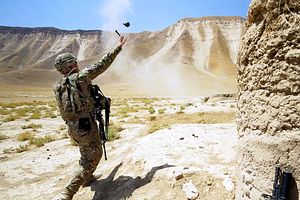Afghan President Ashraf Ghani, traveling to India for a three-day state visit, left a few hours later than planned in order to meet with General John Campbell, head of the United States’ follow-on training and support mission in the country, Resolute Support.
Details haven’t been released as to the specific contents of last-minute meeting, but it is believed that Ghani, his top security advisors, and Campbell discussed the deteriorating situation in Kunduz. Over the weekend violence spiked in Kunduz, which is in northern Afghanistan and borders Tajikistan. TOLOnews reported that the Provincial Governor Mohammad Omar Safi said 40 insurgents and 12 members of the Afghan security forces had been killed so far but that fighting was ongoing. TOLOnews also reported that 2000 reinforcement troops have deployed to the area.
The Taliban officially announced the start of the spring offensive last week. The fighting season in Afghanistan heats up when the snow melts, allowing easier travel over the mountains along the Afghan-Pakistan border. The 2015 fighting season will be the first in which Afghan security forces face insurgents on their own and some analysts fear that they will face not just the Taliban.
An AP story in the New York Times highlighted the fears of many:
But after more than a decade of war, the Taliban appear no closer to their goal of overthrowing the Kabul government, something that has opened up an opportunity for what is perceived to be an affiliate of the Islamic State group, which already controls large parts of Iraq and Syria, to establish a small presence in Afghanistan. The development has alarmed many Afghans.
Not all, however, are as convinced of the ISIS threat in Afghanistan. Last week Kate Clark of the Afghan Analysts Network published an excellent in-depth examination of the Jalalabad attacks — which the Taliban denied and the regional ISIS affiliate claimed. She comments that:
It is impossible at this stage to say for certain whether these attacks were carried out by the Taliban or by IS or IS sympathizers. UNAMA seems correct in its call for the presence of Islamic State in Afghanistan to be meticulously evaluated to ascertain if militants are committing violence under a different name.
Whichever group was responsible for the Jalalabad attacks and the ongoing fighting in Kunduz may be difficult to assess but underscores the tenuous position Ghani, and the Afghan government, sits in.
Ghani’s trip to India comes at crucial moment in Afghan-Indian relations. The Afghan president is scheduled to meet with Indian President Pranab Mukherjee, Indian Prime Minister Narendra Modi, and Defense Minister Manohar Parrikar, among other senior officials. Ghani, in the eyes of many, has pursued a general rapprochement with Pakistan, a country his predecessor Hamid Karzai left office at odds with. Meanwhile, India and Pakistan had been sparring in various ways over influence in Afghanistan.

































